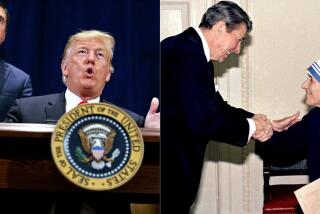Despite a Rebuff, Reagan Still Talks to Soviet People : Uses Voice of America for New Year’s Message
- Share via
PALM SPRINGS — President Reagan, rebuffed in his effort to address the people of the Soviet Union on television, attempted Wednesday to beam his New Year’s greetings there via the Voice of America, saying that “we must continue together on the journey toward lasting peace.”
In a 10-minute radio speech being broadcast around the globe by the U.S. government radio agency, Reagan seemed to address the Soviet leaders as much as the citizenry, linking lasting progress in U.S.-Soviet relations to Soviet respect for human rights.
“Let us remember that respect for those rights, for the freedom and dignity of individuals, is also the bedrock on which any true and enduring peace between our countries must be built,” he said. “We welcome progress in this area as much as we welcome it in the effort to secure nuclear arms reduction.”
And, in an apparent reference to the Soviet decision that freed dissident Andrei D. Sakharov from internal exile, Reagan remarked:
“Whenever there’s a restoration of those rights to a man or a woman, as has happened recently, it helps strengthen the foundations for trust and cooperation between our countries.”
Impact Uncertain
The impact of the President’s remarks remained uncertain, because Moscow regularly uses electronic jamming to disrupt U.S. broadcasts aimed at the Soviet Union.
There were reports, unconfirmed by the White House, that the initial broadcasts were interrupted.
White House spokesman Larry Speakes said that such jamming would have “a telling effect as far as the Soviet Union’s attitude toward freedom, free speech, the ability of their people to hear messages from other countries.”
Offering a look at the state of U.S.-Soviet relations, Reagan said that “a great deal of work remains, but both sides are closer now than ever before.”
But the delivery of the remarks on the Voice of America--rather than on Soviet television--reflected the continuing disputes between the two nations.
U.S. Request Turned Down
Speakes had said Tuesday that the Soviets had turned down the U.S. request that Reagan speak on Soviet television and that Soviet leader Mikhail S. Gorbachev appear on U.S. television, as they had done the year before.
The Soviet Union said, however, that the state of U.S.-Soviet relations was so bad that Gorbachev would refuse to allow the exchange to occur.
So, Reagan turned to the Voice of America to broadcast a speech that he recorded Monday in Los Angeles before flying to Palm Springs for the year-end holiday. By law, VOA broadcasts can be beamed only to foreign listeners.
Reagan referred to the Soviet government’s refusal to allow him access to the state-run television system, and told his audience: “Your government officials declined our offer to have such an exchange of greetings.”
According to the White House, Reagan’s remarks were translated not only into Russian, but into eight other languages spoken in the Soviet Union--Ukrainian, Georgian, Uzbek, Armenian, Azerbaijani, Latvian, Estonian, and Lithuanian. The speech also was being broadcast in the native tongues of other Soviet Bloc nations.
The broadcasts were begun about midnight in parts of the Soviet Union, and carried on subsequent broadcasts.
‘Good Evening’ in Russian
“Good evening, and s novym godom, “ said the President, using a Russian phrase comparable to “happy new year.”
A year ago, Reagan spoke on Soviet television, telling his audience that in 1986 he and the Soviet leader would continue the discussions begun in Geneva in November, 1985, with a summit meeting in the United States. But such a conference did not take place in the year just ended.
Instead, Reagan and Gorbachev conferred in Reykjavik, Iceland, in October--at a meeting whose progress is viewed more positively by the White House than by the Kremlin.
“There have been setbacks and frustrations, as well as progress,” Reagan said. “I’m disappointed that we didn’t accomplish more. And yet in 1986 the United States and Soviet Union took major steps toward lasting peace.”
He said that at the Iceland summit, agreement was reached on the goal of reducing the superpowers’ nuclear arsenals, to cut the number of strategic arms in half over five years.
Differences Over ‘Star Wars’
But no agreement was signed, and the talks fell apart over differing approaches to the role of space-based missile defenses, a program known in the United States as the Strategic Defense Initiative or “Star Wars.”
“As we look to the New Year, we in America remain ready to continue to do everything necessary to turn this hard work into verifiable agreements,” Reagan said. “Our hope is that the Soviet Union will approach negotiations with this same spirit.”
On another matter, Reagan marked the 10th anniversary of the founding of the Czechoslovak human rights intitiative Charter 77.
In a written statement issued by the White House, the President said that “despite imprisonment and intimidation,” the members of the organization “have persisted in issuing numerous documents on many aspects of Czechoslovak life and on international affairs.”
“The more than 1,000 signatures of the charter to date have had influence far beyond their numbers,” he said.
More to Read
Sign up for Essential California
The most important California stories and recommendations in your inbox every morning.
You may occasionally receive promotional content from the Los Angeles Times.












